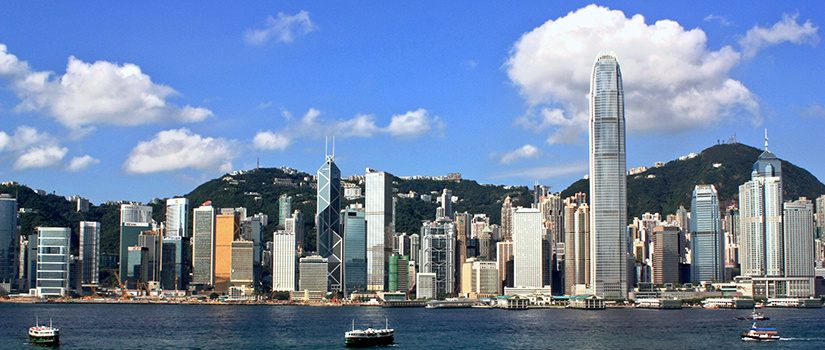The University of South Carolina's Darla Moore School of Business and the Chinese University of Hong Kong have partnered to form the International Business and Chinese Enterprise program. This selective four-year study is designed to develop students to operate and succeed in the Chinese business environment. The IBCE cohort will be made up of 10 students from UofSC and 10 students from CUHK who will study together for two years, taking courses on each other’s campuses while learning valuable teamwork and networking skills by relying on their peers for support when navigating a new country. The whole group takes marketing management and marketing in China (or similar) together during the sophomore year at CUHK and the introductory international business course, IBUS 310: Globalization and Business, together in the fall of their third year. This program offers many tools for learning Mandarin Chinese (Putonghua). At the completion of their four years, students will be proficient in the language. In addition to gaining in-depth knowledge of Chinese business and culture, students will develop a ready-made network among Chinese and American cohort members and professionals in each market that will serve them well throughout their professional careers.
Year 1: Students spend their freshman year at South Carolina. They will spend the summer in Taiwan participating in a language immersion program to accelerate their learning of Mandarin.
Year 2: South Carolina students will travel to Hong Kong to unite with their CUHK counterparts for the academic year. During the summer, IBCE students may return to the US or may elect to participate in additional education abroad programs in Asia.
Year 3: Both South Carolina and CUHK students come to study at South Carolina together.
Year 4: South Carolina students will complete their degree requirements at South Carolina for a May graduation.
During their year abroad, tuition will be assessed on an exchange basis — that is, they pay tuition to their home institutions rather than the university they visit. Exchange tuition is assessed at the in-state rate for South Carolina students, regardless of residency status. Their housing and other living expenses will be based on the accommodations secured in-country and will vary accordingly. Students pay the Mandarin Training Center at the National Taiwan Normal University (NTNU) directly for summer language training in Taiwan, housing, and other expenses.
Students should expect additional costs including but not limited to airfare to and from Hong Kong, local transportation, local cell phone plan, and required group travel expenses.
Students in the IBCE program can double major in accounting, economics, finance, management, marketing, operations and supply chain, real estate, or risk management and insurance. The curriculum is designed to be integrated across the two institutions, with preparation for the program beginning as freshmen. In today’s globalized world it is more important than ever to be able to communicate across borders, and with intensive summer immersion classes, students will graduate with high proficiency in Mandarin. CUHK boasts not only a prestigious and invigorating curriculum but also a strong alumni network, offering potential intern and job opportunities.
IBCE students have the opportunity to delve into the business world while embracing cultural exchanges. Through this program they will learn the importance of mutual respect and tolerance as well as the value of a well-rounded education.
CUHK aims to nurture students with both specialized knowledge and wisdom for life. The education experience is distinguished by bilingualism and multiculturalism with courses that broaden students’ perspectives and develop in them the ability to face the challenges of the business world. The university’s insistence on the highest standards of research has won it an enviable research reputation globally and boasts highly respected faculty and alumni. The college programs and activities offered by CUHK complement the formal curricula by encouraging intimate interaction among teachers, students and alumni.
Hong Kong is truly a cosmopolitan center of trade with a unique blend of Western and Eastern cultures and values. In 1997, Britain returned this region to Chinese rule, and Hong Kong became a specialized territory of China with a high degree of autonomy. The economic system of free trade remained, allowing commerce to continue to develop. Today, Hong Kong is still a central point for shipping and international trade and has rapidly increased in service sectors such as communications and finances.
Although the main language spoken in Hong Kong is Cantonese, English and Mandarin are also officially recognized and commonly used in the region. IBCE students focus on gaining a high proficiency in Mandarin (Putonghua) Chinese during their time in Asia in order to develop their professional capacities and future bridges with mainland China. Prior knowledge or study of Chinese is not a prerequisite for admission into the program. Non-native speakers will take part in an intensive summer language study in Taiwan and have the option to complete a second summer in Asia.
While Hong Kong culture has been highly influenced by European ideologies and business structure can often closely resemble North American business practices, most citizens still practice the ancient Chinese teachings and values found in Taoism, Buddhism and Confucianism. Some examples of these teaching include Feng Shui, family solidarity, saving face and modesty. Christianity, Islam and other religious also coexist in the region.
Expect Hong Kong nationals to be motivated, highly educated and globalized. However, Chinese routes make them notorious for their indirect communication styles. Westerners entering these cultures have to learn to read between the lines. For example, a national will rarely say "no" straight out, and a nod of the head might not actually mean "yes."
